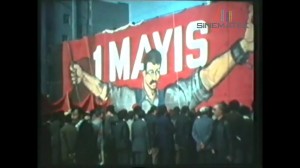
“Kaya Tanyeri 1 Mayıs 1977 mitingine elinde 8 mm kamerası ile katıldı. Kızı Çağla Tanyeri de ses kayıtlarını alıyor ve babasına yardım ediyordu. Kaya Tanyeri miting öncesi Beşiktaş’taki coşkuyu ve Taksim’e yürüyüşü kaydetti. Taksim meydanına geldiğinde ve “malum” katliam başladığında ne yazık ki çekimi yapamadı. Öncesinde çektikleri ile sonradan yaşanan katliamın fotoğraflarını kullanarak ve “Görevimiz Tehlike” filmine gönderme yaparak kurguladı. Hiç gösterimi yapılmadı. Bu film yıllarca Kaya Tanyeri’nin kişisel arşivinde kaldı. Ta ki bize erişinceye kadar. Biz bu filmi ve Güneşli Bataklık filminin kamera arkası belgeseli olan ‘Güneşe Dönük Kamera’ isimli 8mm filmlerini dijitalleştirdik. ve işte sizlerle paylaşıyoruz.” Sinematek.tv: http://sinematek.tv/1-mayis-77-1977/ (1 November 2019).
“Kaya Tanyeri attended the meeting, 1 May 1977, with an 8mm camera in his hands. Her daughter, Çağla Tanyeri, was assisting the recording as well. Before the meeting, Kaya Tanyeri made a record of the "enthusiasm" in Beşiktaş and the march on Taksim. When they came to Taksim, the infamous massacre was just starting and he could not continue to record everything. Using the former shootings and the photographs of the massacre, he edited the multiple audiovisual resources in reference to the Mission: Impossible. The film has never been screened before and it was stored in Kaya Tanyeri’s archive until Çağla Tanyeri found the original material. The original 8 mm film was digitized to share with a larger audience by Sinematek.” Sinematek.tv: http://sinematek.tv/1-mayis-77-1977/ (1 November 2019).
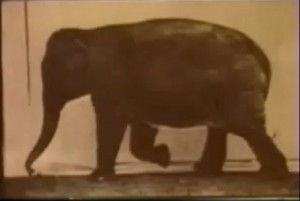
"Between 1877 and 1885, an English photographer, Eadweard Muybridge, conducted detailed experiments analyzing human and animal motion using rapid photography. In 1968, John Straiton took the published works of Muybridge and created from them a fascinating and hilarious film. A tribute to the serious maker of the first nudie before the invention of movies." Canadian Filmmakers Distribution Centre.
"The Art of Photo Engraving, 1600 ft., 16mm., filmed by Edward J. Schon, tells the story of photo engraving from the first step to the last. It makes the complete process clear to the nontechnical audience while its interest to the engraver is such that Mr. Schon was invited to attend the recent American Photo Engravers' Convention in Philadelphia to screen the film and speak on his experiences in making it. It is probable that this excellent amateur made industrial has initiated a series of similar films on the same topic. Because of the unusually careful focusing and consistently even exposure, in spite of the wide variety of lighting conditions met with in interior scenes, this film is photographically outstanding. The continuity, presenting the plant's operations in natural sequence, is commendable for its clarity, particularly in view of the numerous complicated processes featured." Movie Makers, Dec. 1930, 759.
"Black Book and Camera has good old George, you know George, photographing all the pretty lassies at the World's Fair. He then asks for their names and addresses so that he can send them a photo. Wouldn't a black book full of names and addresses be worth a pretty penny? W-e-l-l. . . George gets a lot of pretty pictures, but as for those names and addresses. . ." PSA Journal, Aug. 1967, 37.
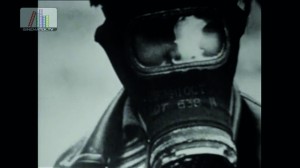
“1975 yılında yapılmıştır. İngiltere'nin İrlanda’daki sömürüsü, politik mahkumları, özgürlük mücadelesi hakkında 5 dakikalık bir filmdir. Dönemin görsel materyal azlığı koşullarında bol fotoğrafla ve az görüntülü bilgilendirme amaçlı bir filmdir.” Sinematek.tv: http://sinematek.tv/davut-ile-golyat/ (1 November 2019).
“It was made in 1975. This 5-minute-long film is about the British exploitation in Ireland, the political struggle [of the Irish people], and the fight for freedom. Because of the lack of visual material at the time of production, it purposefully benefits from the use of [the historical] photographs as counter-information.” Sinematek.tv: http://sinematek.tv/davut-ile-golyat/ (1 November 2019).
"Grandmother's Portrait is a documentary on the making of a modernistic, even abstract, metal "portrait" inspired by a photograph of the artist's grandmother. The artist doing the sawing and welding needed to construct the "portrait" is Kasperi Lofgren" PSA Journal, Sept. 1965, 50.
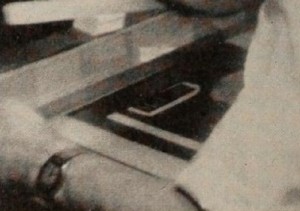
"No matter how one feels about the outside cover of a magazine, George E. Valentine's The Inside Story of the Outside Cover will be a surprise. If you think that the production of four color engraving plates is a simple matter, you will do some quick revising of your thinking. If you have a certain admiration for the technical skill that goes into such work, that admiration is likely to be heightened by Mr. Valentine's step by step story of the creation of a four color magazine cover. Aside from the story it tells, Mr. Valentine's film is a real technical achievement because of the working conditions under which most of the shots were of necessity filmed. His peak sequence — a proof-press run analyzed in slow motion — was achieved by mounting the camera directly on the moving press. When you can do that, you're good." Movie Makers, Dec. 1947, 539.
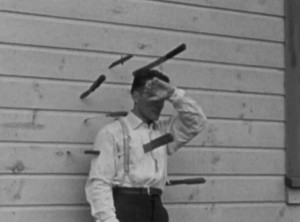
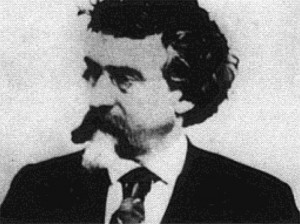
"Mathew Brady, the historian with a camera, photographed everyone of importance including Andrew Jackson, Henry Clay, Edgar Allen Poe, Abraham Lincoln, and many battle scenes of the Civil War. This motion picture is built entirely of photographs by Brady and his cameraman. Mr. Southard has used the zoom lens and lap dissolves to create a feeling of movement, supported by a good sound track" PSA Journal, Oct. 1961, 49.
"Family members pose for photographs outside a house in Cockermouth; later they are seen running around in the garden. The photographer is seen discussing his camera. Shots of a ruined mill building after a fire." (NWFA Online Database)
Total Pages: 2